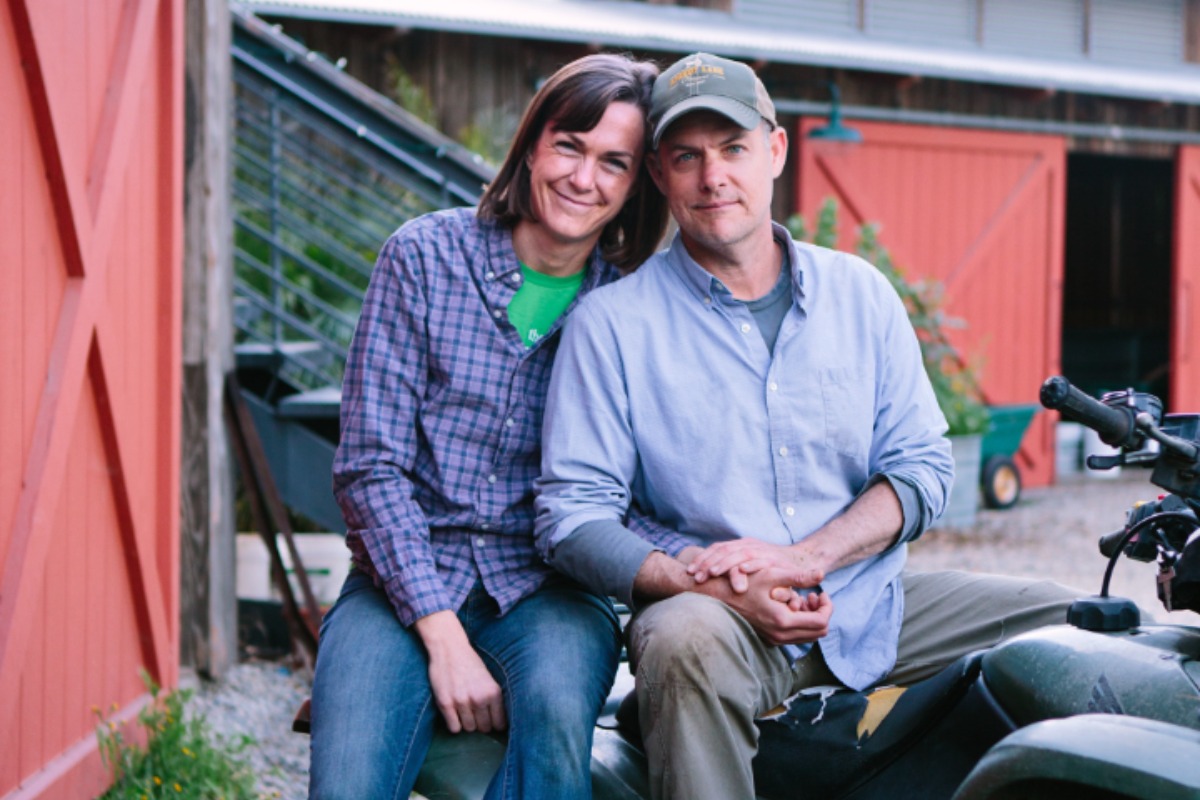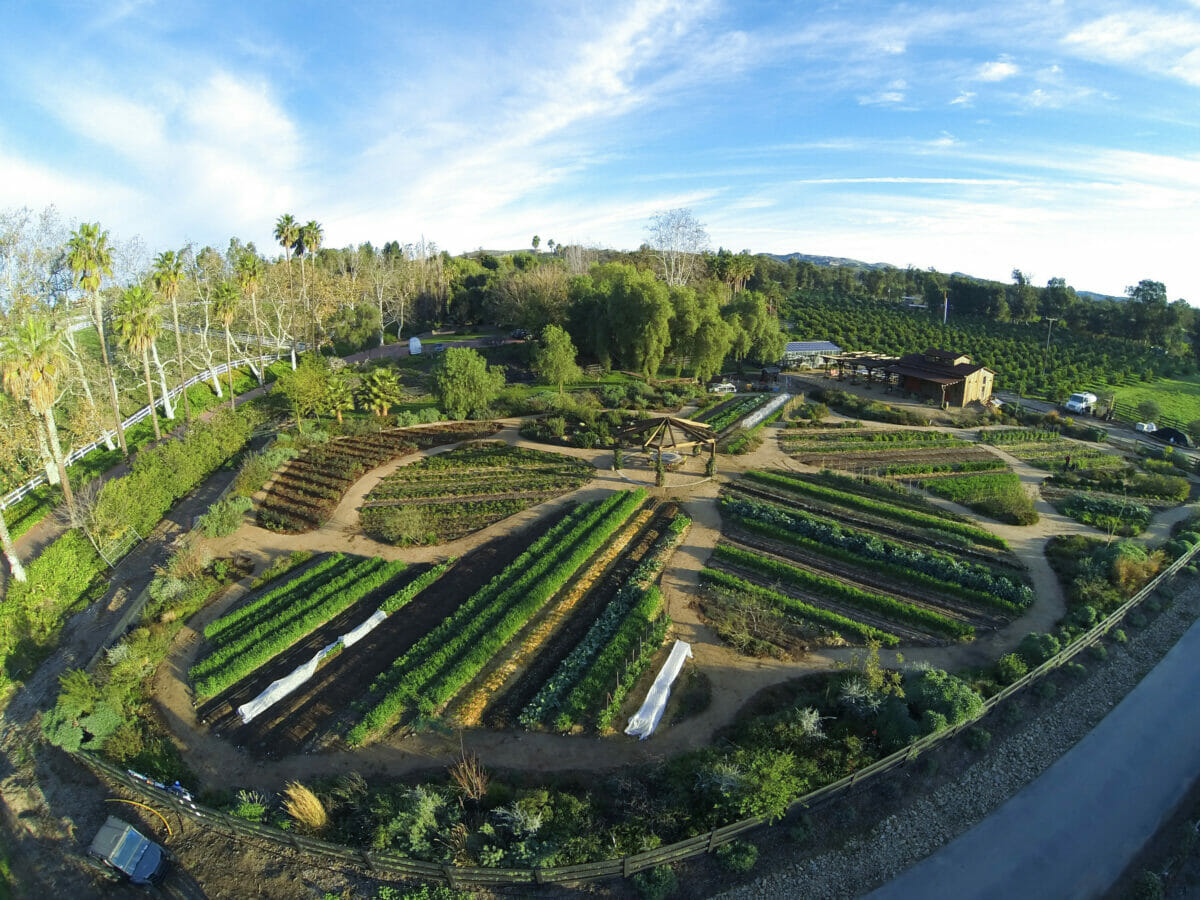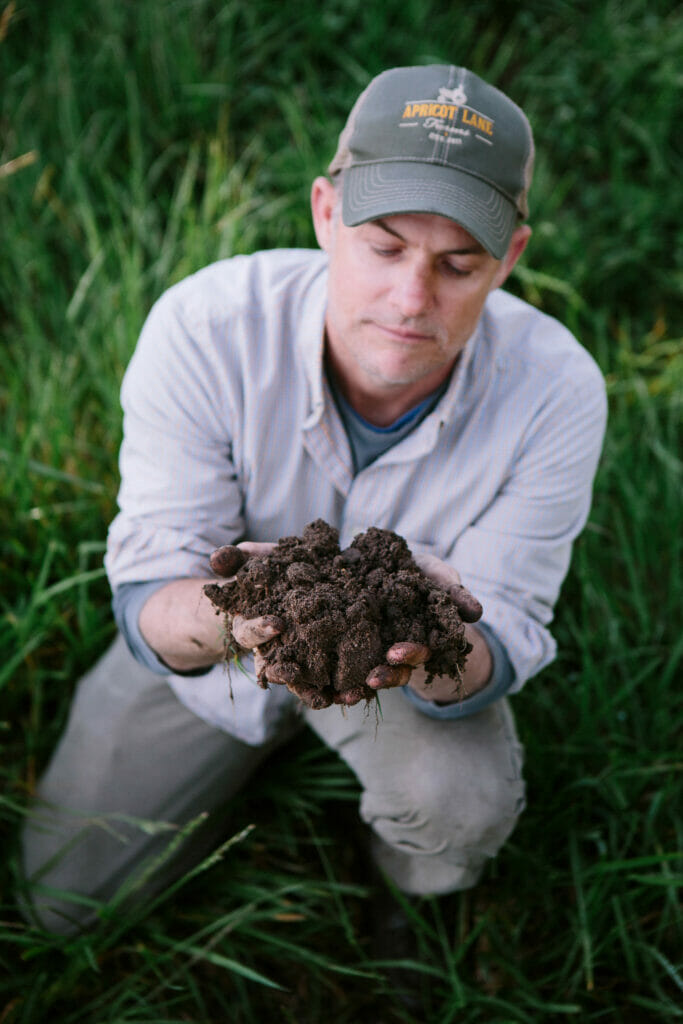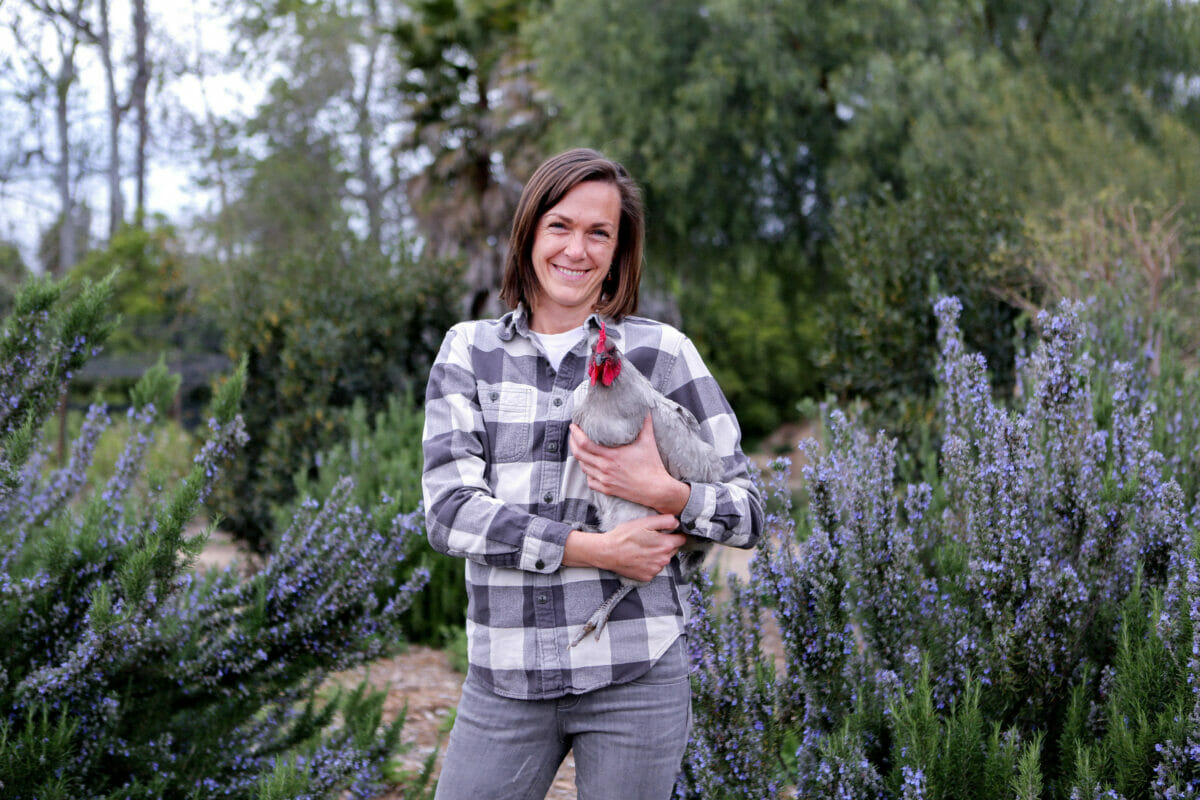The Biggest Little Farm Is Back With a New Special
John and Molly Chester brought regenerative farming to a new audience with their documentary in 2018. Now, the family returns in a new special—with a cookbook slated for later this year.
The Biggest Little Farm Is Back With a New Special
John and Molly Chester brought regenerative farming to a new audience with their documentary in 2018. Now, the family returns in a new special—with a cookbook slated for later this year.

Farmers Molly and John Chester, founders of Apricot Lane Farms, a large biodynamic farm in Southern California.courtesy of Apricot Lane Farms/Yvette Roman.
When we last saw Molly and John Chester, they were elbow deep in dirt. The couple was trying to figure out how to revitalize their 214-acre farm, which had grown fallow from years of extractive farming. The soil was dry, clumping together in hard clods, and as John and Molly dug further, things didn’t look great.
It was a tough position for the Chesters. In 2011, the couple were evicted from their Los Angeles apartment, and instead of finding a new place in the city, they moved an hour north to Moorpark, in Ventura County, putting their money into the farm. Over the next several years, Molly and John transformed the land and soil around them. From that first hard clod of dirt to a sprawling acreage, the Chesters turned their land into Apricot Lane Farms.
John, a film and television director, documented everything, and after years of collecting footage, pulled it all together into an award-winning documentary called The Biggest Little Farm, which premiered in 2018. Now, they’re back with a new special, The Biggest Little Farm: The Return, streaming on Disney+. “We’ve never stopped filming,” John says.

After the release and success of the initial documentary, the farm quickly became a tourist destination. Travelers flocked to Apricot Lane to learn about regenerative farming, and they also wanted updates on the family and the animals they had come to know through the documentary. The Chesters were happy to oblige. As more visitors made their way to the farm, they realized there was still a lot to share about farming. “People don’t have a deep understanding around the possibilities that exist within this life, when you’re looking at ecosystem farming,” John says. So, they put together a follow-up special, with an upcoming TV series also in the works.
The Return picks up where the original documentary left off. Viewers get to see how the farm has changed and adapted over the years as the Chesters put more regenerative farming techniques into practice. Initially, their approach to farming was additive; coming up with a solution to a problem by figuring out what was lacking. Snails attacking the garden? Time to release a flock of ducks into the grasses. That takes care of the snail problem and adds in some much-needed fertilizer to the soil. The “what can we add?” approach served their purposes well, but it was also necessary at the time.
“There’s nothing to take away at that stage, because there was nothing there,” Molly explains. “At the beginning, you just look at the soil. You have got to keep putting in nutrients.”
The couple aimed to rebuild the soil diversity, working from the top down. They brought in all sorts of animals, from ducks to pigs to sheep. They planted 75 different varieties of fruit trees in a sprawling circular pattern they’ve named “the fruit basket.” They restored native plants to their pond, which is now a certified wildlife habitat. Now, as we check back in with the Chesters in this new special, we can see the results of their efforts and find out how and where they’ve learned to pare down.

In the short time since the original documentary premiered, water conservation has become even more important for farms, especially in California. As such, their approach to water management is something the Chesters are actively reworking. “Our goal has always been holding as much water as possible,” John says. “We’ve planted a lot of things that need way more water than we should be using. Carob and pomegranates, things like that.”
In the film, we see Molly and John deal with the panic of evacuating their farm when a wildfire threatens the area. That’s an ongoing threat, along with heat waves and droughts that plague the West Coast. John likens it to a puzzle; trying to figure out how to keep more water in the ground while also planting things that use less water over time. Their efforts have seemingly paid off. Apricot Lane Farms has, so far, proven to be resilient in the extreme weather that California regularly faces. Now, John hopes other farms will focus on similar efforts.

While John is mainly focused on the farming side, Molly, a chef, has spent their years on the farm developing recipes to share with others. Her upcoming Apricot Lane Farms Cookbook will be released in October and looks at food from the unique perspective of a farmer. It’s the kind of relationship that Molly and John have nurtured from the first frame of their documentary film. The couple has always looked at how each input on a farm—including the humans—intersects with every other input. “We tapped into a time when the audience needed to [learn] how to view the interconnected natural world that surrounds them. That there is a purpose to every part of what’s happening,” John says.
Now, thinking about the impact of their farm and their cultural offerings, the couple can see how more people are embracing a farming lifestyle. When they go to their local farmers’ market, “people tell us about having taken over their aunt’s farm or moved out into the country or started growing tomatoes on their porch,” Molly says. “We’ve definitely felt this [sense of] ‘welcome back.’”
Follow us
This work is licensed under a Creative Commons Attribution-NoDerivatives 4.0 International License.
Want to republish a Modern Farmer story?
We are happy for Modern Farmer stories to be shared, and encourage you to republish our articles for your audience. When doing so, we ask that you follow these guidelines:
Please credit us and our writers
For the author byline, please use “Author Name, Modern Farmer.” At the top of our stories, if on the web, please include this text and link: “This story was originally published by Modern Farmer.”
Please make sure to include a link back to either our home page or the article URL.
At the bottom of the story, please include the following text:
“Modern Farmer is a nonprofit initiative dedicated to raising awareness and catalyzing action at the intersection of food, agriculture, and society. Read more at <link>Modern Farmer</link>.”
Use our widget
We’d like to be able to track our stories, so we ask that if you republish our content, you do so using our widget (located on the left hand side of the article). The HTML code has a built-in tracker that tells us the data and domain where the story was published, as well as view counts.
Check the image requirements
It’s your responsibility to confirm you're licensed to republish images in our articles. Some images, such as those from commercial providers, don't allow their images to be republished without permission or payment. Copyright terms are generally listed in the image caption and attribution. You are welcome to omit our images or substitute with your own. Charts and interactive graphics follow the same rules.
Don’t change too much. Or, ask us first.
Articles must be republished in their entirety. It’s okay to change references to time (“today” to “yesterday”) or location (“Iowa City, IA” to “here”). But please keep everything else the same.
If you feel strongly that a more material edit needs to be made, get in touch with us at [email protected]. We’re happy to discuss it with the original author, but we must have prior approval for changes before publication.
Special cases
Extracts. You may run the first few lines or paragraphs of the article and then say: “Read the full article at Modern Farmer” with a link back to the original article.
Quotes. You may quote authors provided you include a link back to the article URL.
Translations. These require writer approval. To inquire about translation of a Modern Farmer article, contact us at [email protected]
Signed consent / copyright release forms. These are not required, provided you are following these guidelines.
Print. Articles can be republished in print under these same rules, with the exception that you do not need to include the links.
Tag us
When sharing the story on social media, please tag us using the following: - Twitter (@ModFarm) - Facebook (@ModernFarmerMedia) - Instagram (@modfarm)
Use our content respectfully
Modern Farmer is a nonprofit and as such we share our content for free and in good faith in order to reach new audiences. Respectfully,
No selling ads against our stories. It’s okay to put our stories on pages with ads.
Don’t republish our material wholesale, or automatically; you need to select stories to be republished individually.
You have no rights to sell, license, syndicate, or otherwise represent yourself as the authorized owner of our material to any third parties. This means that you cannot actively publish or submit our work for syndication to third party platforms or apps like Apple News or Google News. We understand that publishers cannot fully control when certain third parties automatically summarize or crawl content from publishers’ own sites.
Keep in touch
We want to hear from you if you love Modern Farmer content, have a collaboration idea, or anything else to share. As a nonprofit outlet, we work in service of our community and are always open to comments, feedback, and ideas. Contact us at [email protected].by Emily Baron Cadloff, Modern Farmer
April 21, 2022
Modern Farmer Weekly
Solutions Hub
Innovations, ideas and inspiration. Actionable solutions for a resilient food system.
ExploreExplore other topics
Share With Us
We want to hear from Modern Farmer readers who have thoughtful commentary, actionable solutions, or helpful ideas to share.
SubmitNecessary cookies are absolutely essential for the website to function properly. This category only includes cookies that ensures basic functionalities and security features of the website. These cookies do not store any personal information.
Any cookies that may not be particularly necessary for the website to function and are used specifically to collect user personal data via analytics, ads, other embedded contents are termed as non-necessary cookies.
The documentary The Biggest Little Farm honestly watches like a movie. Superb cinematography, human interest, cute baby animals, drama, and even suspense!
Where do we view the documentary?